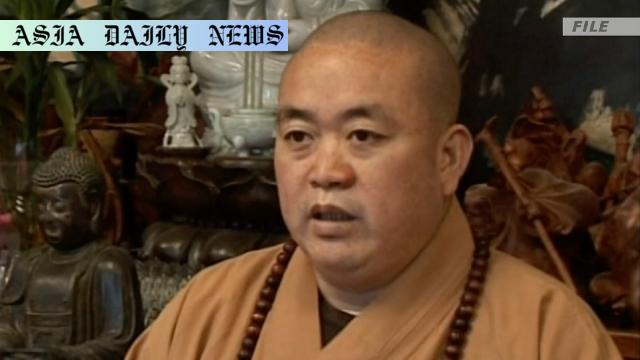Shaolin Temple is under scrutiny as its head monk, Shi Yongxin, faces accusations of embezzlement and improper conduct.
- Key Point 1: The head monk of Shaolin Temple, Shi Yongxin, is under investigation for financial misconduct and relationships with women.
- Key Point 2: The investigation involves accusations of misappropriation of temple assets and violation of Buddhist teachings.
- Key Point 3: Shi Yongxin, often called ‘CEO monk,’ has been involved in unconventional business ventures under the temple’s name.
- Key Point 4: Shaolin Temple’s reputation as a symbol of kung fu and Buddhism may face implications due to the allegations.

The Scandal Surrounding Shaolin Temple’s Head Monk
The revered Shaolin Temple, known globally as a cultural and spiritual icon of martial arts, is facing scrutiny after allegations surfaced against its abbot, Shi Yongxin. This epicenter of Buddhist philosophy and kung fu in Henan Province has been thrust into controversy due to claims that the abbot has misused temple funds and engaged in behaviors inconsistent with Buddhist teachings. Abbot Shi Yongxin, often referred to as the ‘CEO monk,’ is now the subject of an investigation by multiple Chinese agencies.
Among the most damning accusations are the allegations that Shi Yongxin embezzled temple funds for personal use and maintained inappropriate relationships with women, reportedly violating vows of celibacy integral to Buddhist principles. Additionally, reports suggest that he fathered a child, adding a deeply personal dimension to the controversy. The fallout of these allegations has cast a shadow over Shaolin Temple’s long-standing global reputation as a center for spiritual discipline and martial arts prowess.
A Web of Financial Entanglements and Controversies
Beyond the moral transgressions, Shi Yongxin’s alleged business dealings have drawn significant criticism. As a deputy head of the Buddhist Association of China and a delegate to the National People’s Congress, he has been instrumental in transforming Shaolin Temple into a brand. Affiliated enterprises ranging from restaurants to clothing lines have reportedly reaped vast profits. While these ventures aimed to modernize and promote Shaolin culture, they have also sparked concerns about prioritizing commercial interests over spirituality. Critics argue that this ‘corporatization of Buddhism,’ driven by Shi’s leadership, undermines the foundational ethos of the Shaolin tradition.
The investigations into Shi Yongxin will determine if these ventures crossed ethical or legal lines. The Shaolin Temple, which has long stood as a bastion of discipline, modesty, and physical skill, now faces a reckoning over whether its leadership has compromised these virtues for material gain. Reports of possible asset mismanagement suggest that money earmarked for sustaining the temple and its religious teachings might have been diverted for inappropriate personal use.
The Global Implications of Shaolin Temple’s Scandal
Shaolin Temple’s global reputation as the birthplace of martial arts and Zen Buddhism magnifies the implications of these allegations. The fallout risks eroding trust among international students, patrons, and tourists who view Shaolin Temple not just as a place to hone physical abilities but as a sacred ground for spiritual enlightenment. Shi Yongxin, once a symbol of the temple’s ability to modernize or engage with contemporary challenges, now faces criticism for allegedly crossing boundaries as both a spiritual and business leader.
The larger question remains: how will Shaolin Temple rebuild its reputation in the eyes of the global community? For centuries, the temple has symbolized a balance between inner harmony and worldly discipline, but such allegations threaten to shift this perception. Moving forward, it is imperative for an independent investigation to bring justice, ensure transparency, and restore the faith of millions in this historic institution.



Commentary
The Tarnished Image of a Revered Institution
The recent allegations against Shi Yongxin bring to mind the constant tension between tradition and modernity. As the head monk of the Shaolin Temple, Shi Yongxin carried the responsibility of preserving an ancient legacy. However, the claims of embezzlement and moral misconduct blur the lines between upholding heritage and succumbing to temptations of contemporary influence. While some argue that monetization was necessary to sustain the temple, others counter that this commercialization eroded its core values.
For many, the Shaolin Temple represents an intangible bridge to both China’s cultural past and spiritual grounding. Martial artists and spiritual seekers across generations have revered the temple as an emblem of self-discipline and enlightenment. Yet, scandals like these could shake the public’s unwavering belief in such institutions. As Buddhism emphasizes detachment from worldly possessions, the allegations leveled against Shi Yongxin resonate as stark contradictions to its teachings.
Rethinking Leadership in Sacred Spaces
What this controversy also sheds light on is the importance of scrutinizing leadership figures who hold influential positions in sacred spaces. Transparency, accountability, and ethical integrity must be fundamental. While the modern world may demand adaptation, it should not be at the expense of ethical principles. Leaders like Shi Yongxin, whose roles symbolize spiritual sanctity, must be examples of righteousness rather than counterexamples.
In conclusion, this case underlines how individuals in authoritative religious roles handle the delicate balance of modern challenges while staying rooted in tradition. Whether Shi Yongxin is proven guilty or not, the Shaolin Temple’s name has already been brought into disrepute. It may take years for it to regain its sanctity in the eyes of devotees and admirers worldwide.